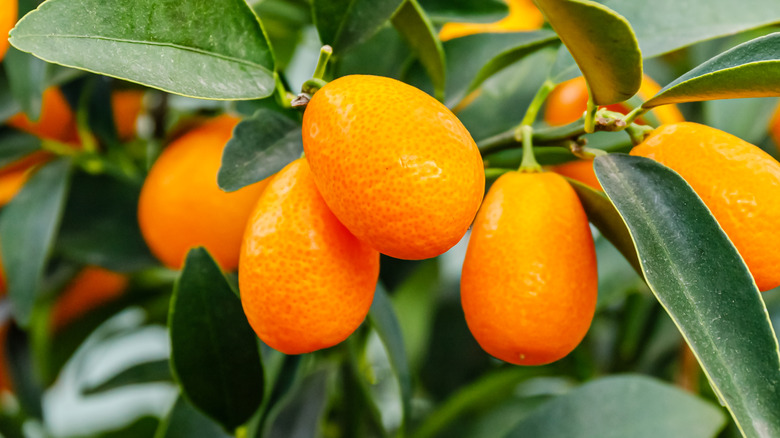Everything You Need To Know About Kumquats
Kumquat is much more than just a fun word — it's an under-appreciated citrus fruit that boasts bright flavor and numerous health benefits.
These small, golden orbs are excellent eaten as is, are a stellar dessert inclusion, and also add depth and complexity to savory dishes. Some say they look like tiny oranges, while others note their resemblance to grapes or cherry tomatoes. They are small — the fruit of some species measures about an inch in diameter, says Britannica; think large olive – and orange-hued, with entirely edible seeds and rind. The rind, also called the peel or the skin, is super thin and easy to eat.
Kumquat means "golden orange" or "golden tangerine" in Cantonese, according to MyRecipes, and Healthline notes that kumquat were originally cultivated in China, but also now grow in many other countries. MyRecipes states that kumquat was a staple throughout Southeast Asia before being brought to Europe in the mid-1800s and then began being grown in North America. NPR notes that they are a symbol of prosperity and are often given as a gift throughout the Chinese community, especially during Lunar New Year.
What do kumquats taste like?
Kumquats offer a textural, light "pop" and their flavor is very citrus-forward. There are both textural and flavor differences inherent in the kumquat; its rind is sweet, while its flesh is tart, according to Healthline. The combination of these flavors results in an incredibly memorable and flavor-forward experience.
Some kumquats can be overwhelmingly sour or tangy, but most are pleasantly tart, and the peel helps to mitigate the intense flavor. Kumquats also have an ease of eating that many other fruits don't offer. Just wash and eat: It's as simple as that.
Their season is November through June and their rind and seeds are all edible. Citrus notes that the kumquat is unique among citrus fruits in that they don't have a bitter pith, that white, gossamer, tissue-esque material that acts as a barrier of sorts between the peel and the flesh in all other citrus fruits.
How do you use kumquats?
Kumquats are delicious when eaten on their own, but they're also a great addition to anything from chutneys and marinades to cakes and purees, says Healthline. Their acidic flavor helps to cut the richness of heavy or meat-forward dishes very well, balancing the flavor and providing an intriguing citrus note. They're excellent in salads, sandwiches, cocktails, smoothies, and soups, and candied kumquats are an excellent addition to a myriad of dishes and beverages. They're great in fruit salads, they make a warming and restorative tea, and some bartenders even sub out olives for kumquats in martinis, according to The Indigenous Bartender.
The Spruce Eats notes interesting varieties of kumquat, including mandarinquat and limequat, which are mandarin-orange-kumquat and lime-kumquat hybrids. In addition, there are many varieties of kumquat: Meiwa (round), Nagami (oval), Jiangsu, and Centennial Variegated, to name a few. Nagami is the most commonly sold type in the US. The shape of the kumquat changes slightly, depending on the variety.
What are the health benefits of kumquats, and where can you buy them?
If you're now finding yourself wondering about the nutritional and health benefits of kumquats, rest assured because they are an incredibly healthy food option. Kumquats are packed with fiber, vitamin C, B vitamins, vitamin E, iron, magnesium, potassium, copper, and zinc. They're very low-calorie and also promote a healthy immune system. They have even been found to kill tumor cells. They are great at regulating weight and help to "minimize growth in fat cell size," according to Healthline. While you may be able to find them at certain supermarkets, you might have better luck buying them at gourmet food stores, Asian grocery stores, farmers markets, or online (via Healthline). No doubt, the rewards in flavor and nutrition will make the search worthwhile.
The next time you're on the hunt for a bright, acidic note to bolster the flavor of whatever you're cooking, bypass the lemons, oranges, and limes, and instead opt for kumquats. We're pretty sure you'll thank us.



